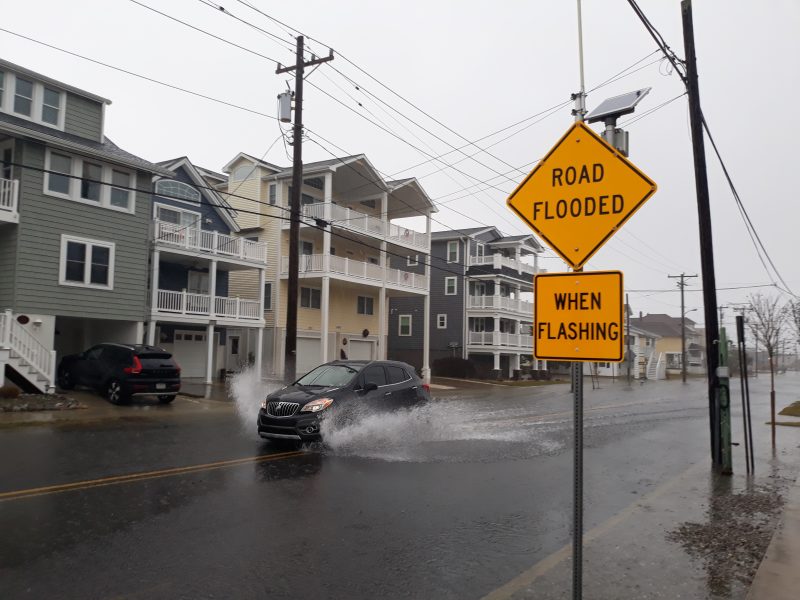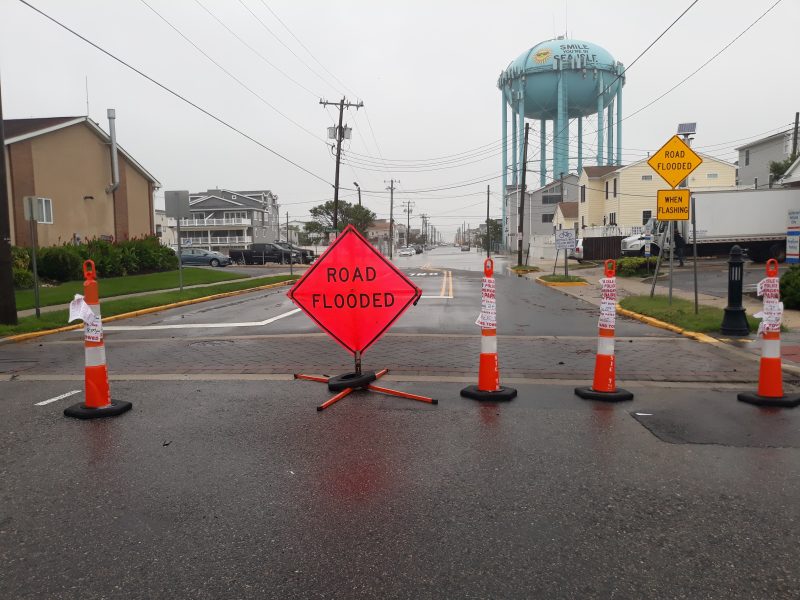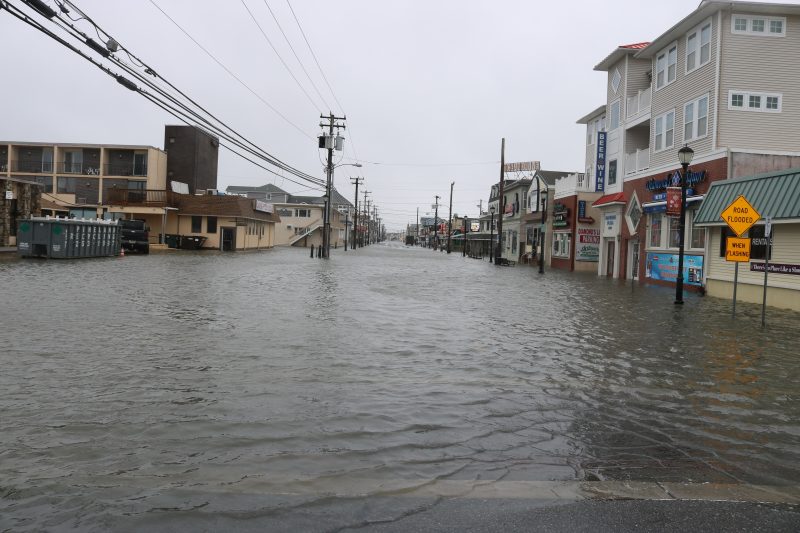 By DONALD WITTKOWSKI
By DONALD WITTKOWSKI
Sea Isle City, considered one of the models nationwide for local flood-prevention measures, is objecting to proposed state regulations designed to protect New Jersey coastal communities from rising sea levels caused by climate change.
City Council approved a resolution at its May 7 meeting that says the proposed regulations, known as Protecting Against Climate Threats, or PACT, would make it prohibitively expensive for residents to build new homes in Sea Isle.
“There has been no public discussion whatsoever concerning the magnitude of the economic impact of these proposed regulations or how to assist residents who will be negatively impacted,” the resolution says.
Moreover, Sea Isle officials are questioning why the PACT regulations are based on an 80-year projection of rising sea levels instead of what they believe would be a more realistic timeframe of 20 or 30 years on the horizon.
“The science behind these 80-year projections is questionable, and there is little support to regulate development using sea level rise projections 80 years into the future,” according to the Council resolution.
The PACT rules, which are proposed by the New Jersey Department of Environmental Protection, would require that new home construction in flood zones should be elevated five feet above the base flood level.
Council President Jack Gibson, who is a civil engineer, explained that Sea Isle requires new construction to be two feet above base flood elevation. He said the five-foot elevation proposed by the PACT regulations is too stringent and would have a negative impact in Sea Isle on home construction and possibly even road projects.
“We know how they’re going to work out. They’re going to be a disaster,” Gibson predicted about the impact the regulations would have on Sea Isle.
Gibson said Sea Isle is “already ahead of the curve” by requiring new construction to be two feet above base flood elevation levels.

As a low-lying barrier island, Sea Isle remains vulnerable to floodwater.
Sea Isle is among just a few cities in the country to have obtained a “Class 3” community rating within the National Flood Insurance Program, entitling local property owners to a 35 percent discount on their flood insurance policies.
Once in danger of being thrown out of the National Flood Insurance Program in 1993, Sea Isle has undergone a dramatic transformation since then and is now ranked as one of the nation’s leading communities in flood prevention.
Over the years, the city has implemented a series of major flood-mitigation projects, such as restoring the beaches and dunes, building bulkheads along the bayfront, reconstructing the roads, upgrading the drainage systems and erecting berms, levees and rock walls. It has also built one stormwater pumping station and has plans for more.
Sea Isle officials say they fully understand the threats to the shore from rising sea levels and are capable of taking their own action to protect the low-lying island from flooding. Councilman William Kehner said Sea Isle and other New Jersey coastal towns don’t want to become “guinea pigs” for the state’s climate control policies.
In defense of the proposed regulations, Gov. Phil Murphy’s administration said the state is “modernizing environmental land use rules to respond to climate change by considering risks such as sea level rise and chronic flooding.”
“Climate change is the single biggest environmental challenge facing the world today. Our State is ground zero for climate impacts, including rising sea levels, more intense and frequent storm events and flooding, and increasing temperature,” the state says on the
www.nj.gov/dep/njpact/ website explaining the PACT regulations.
Cape May County has already formally objected to the PACT rules, claiming that the regulations have the potential to significantly devalue shore property and stymie construction.
Sea Isle based its resolution criticizing the PACT rules on a similar one adopted by the Cape May County Board of Commissioners, the governing body for county government.

Landis Avenue is flooded in Sea Isle City's downtown business district during a storm in February 2021.
Both the Sea Isle and Cape May County resolutions emphasize that “thoughtful and well-reasoned” environmental regulations are of the “utmost importance” for protecting coastal waters from the threat of rising sea levels caused by climate change.
However, the resolutions contend that the Department of Environmental Protection did not follow the accepted practice of having the PACT regulations backed up by corresponding state legislation.
“In this case there is no legislation that has authorized the NJDEP to require more stringent requirements than the federal regulations that are now in place,” Sea Isle’s resolution says.
Sea Isle officials hope there will be enough formal opposition from towns in Atlantic and Cape May counties to stop the proposed regulations from becoming law.
In the meantime, City Council is calling on state lawmakers to step in and exercise their legislative oversight “to ensure the fairness and the maximum public acceptance of those regulations.”
 By DONALD WITTKOWSKI
Sea Isle City, considered one of the models nationwide for local flood-prevention measures, is objecting to proposed state regulations designed to protect New Jersey coastal communities from rising sea levels caused by climate change.
City Council approved a resolution at its May 7 meeting that says the proposed regulations, known as Protecting Against Climate Threats, or PACT, would make it prohibitively expensive for residents to build new homes in Sea Isle.
“There has been no public discussion whatsoever concerning the magnitude of the economic impact of these proposed regulations or how to assist residents who will be negatively impacted,” the resolution says.
Moreover, Sea Isle officials are questioning why the PACT regulations are based on an 80-year projection of rising sea levels instead of what they believe would be a more realistic timeframe of 20 or 30 years on the horizon.
“The science behind these 80-year projections is questionable, and there is little support to regulate development using sea level rise projections 80 years into the future,” according to the Council resolution.
The PACT rules, which are proposed by the New Jersey Department of Environmental Protection, would require that new home construction in flood zones should be elevated five feet above the base flood level.
Council President Jack Gibson, who is a civil engineer, explained that Sea Isle requires new construction to be two feet above base flood elevation. He said the five-foot elevation proposed by the PACT regulations is too stringent and would have a negative impact in Sea Isle on home construction and possibly even road projects.
“We know how they’re going to work out. They’re going to be a disaster,” Gibson predicted about the impact the regulations would have on Sea Isle.
Gibson said Sea Isle is “already ahead of the curve” by requiring new construction to be two feet above base flood elevation levels.
By DONALD WITTKOWSKI
Sea Isle City, considered one of the models nationwide for local flood-prevention measures, is objecting to proposed state regulations designed to protect New Jersey coastal communities from rising sea levels caused by climate change.
City Council approved a resolution at its May 7 meeting that says the proposed regulations, known as Protecting Against Climate Threats, or PACT, would make it prohibitively expensive for residents to build new homes in Sea Isle.
“There has been no public discussion whatsoever concerning the magnitude of the economic impact of these proposed regulations or how to assist residents who will be negatively impacted,” the resolution says.
Moreover, Sea Isle officials are questioning why the PACT regulations are based on an 80-year projection of rising sea levels instead of what they believe would be a more realistic timeframe of 20 or 30 years on the horizon.
“The science behind these 80-year projections is questionable, and there is little support to regulate development using sea level rise projections 80 years into the future,” according to the Council resolution.
The PACT rules, which are proposed by the New Jersey Department of Environmental Protection, would require that new home construction in flood zones should be elevated five feet above the base flood level.
Council President Jack Gibson, who is a civil engineer, explained that Sea Isle requires new construction to be two feet above base flood elevation. He said the five-foot elevation proposed by the PACT regulations is too stringent and would have a negative impact in Sea Isle on home construction and possibly even road projects.
“We know how they’re going to work out. They’re going to be a disaster,” Gibson predicted about the impact the regulations would have on Sea Isle.
Gibson said Sea Isle is “already ahead of the curve” by requiring new construction to be two feet above base flood elevation levels.

 Landis Avenue is flooded in Sea Isle City's downtown business district during a storm in February 2021.
Both the Sea Isle and Cape May County resolutions emphasize that “thoughtful and well-reasoned” environmental regulations are of the “utmost importance” for protecting coastal waters from the threat of rising sea levels caused by climate change.
However, the resolutions contend that the Department of Environmental Protection did not follow the accepted practice of having the PACT regulations backed up by corresponding state legislation.
“In this case there is no legislation that has authorized the NJDEP to require more stringent requirements than the federal regulations that are now in place,” Sea Isle’s resolution says.
Sea Isle officials hope there will be enough formal opposition from towns in Atlantic and Cape May counties to stop the proposed regulations from becoming law.
In the meantime, City Council is calling on state lawmakers to step in and exercise their legislative oversight “to ensure the fairness and the maximum public acceptance of those regulations.”
Landis Avenue is flooded in Sea Isle City's downtown business district during a storm in February 2021.
Both the Sea Isle and Cape May County resolutions emphasize that “thoughtful and well-reasoned” environmental regulations are of the “utmost importance” for protecting coastal waters from the threat of rising sea levels caused by climate change.
However, the resolutions contend that the Department of Environmental Protection did not follow the accepted practice of having the PACT regulations backed up by corresponding state legislation.
“In this case there is no legislation that has authorized the NJDEP to require more stringent requirements than the federal regulations that are now in place,” Sea Isle’s resolution says.
Sea Isle officials hope there will be enough formal opposition from towns in Atlantic and Cape May counties to stop the proposed regulations from becoming law.
In the meantime, City Council is calling on state lawmakers to step in and exercise their legislative oversight “to ensure the fairness and the maximum public acceptance of those regulations.”